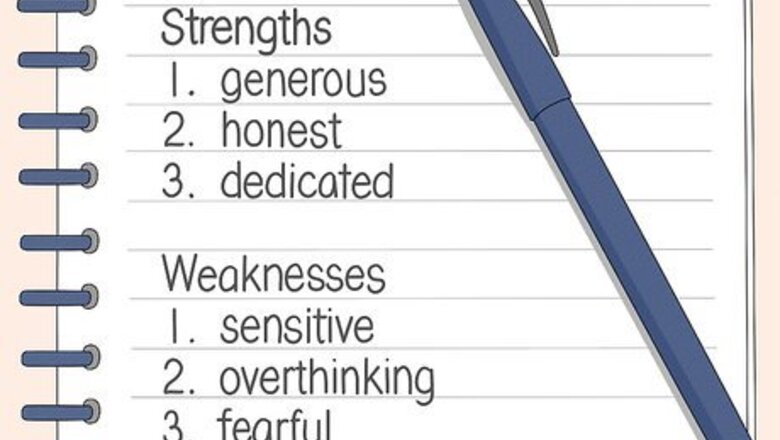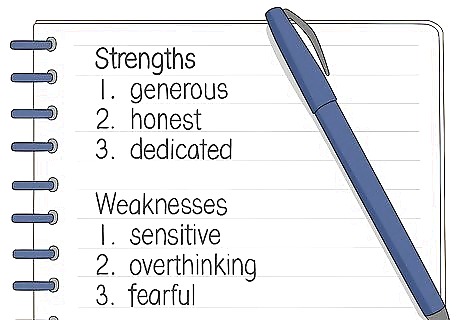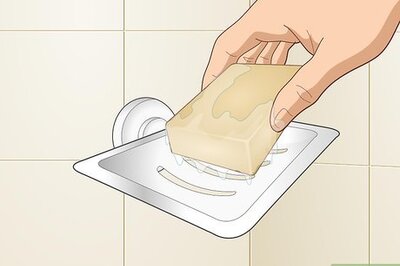
views
Identify your strengths and weaknesses.

Note the changes you want to make while also emphasizing your skills. First, think about the good that you bring to your relationship. How might you use your strengths to benefit your relationship? Then, consider what might need improving. How would you like to change going forward? Reflecting on your behavior in the relationship honestly is a huge step, as it helps you identify the changes that will improve your relationship. Your strength may be that you are very generous and are always there when your partner needs help. How can you continue to be there for your partner in their times of need? If you're a sensitive person, you might struggle to get through conflict without shutting down and ignoring your partner. How might you try to be more present in your relationship when things get tough? If you're struggling to reflect, try journaling. Write about your thoughts, feelings, and recent day-to-day life in the relationship to learn more about yourself.
Set goals to help yourself improve.

Goals make holding yourself accountable more manageable. Identify a few things about your behavior that you would like to change. Then, think about how you might go about making those changes. Set a timeframe for these goals that seems reasonable to you and consider writing them down so you won't forget them. Maybe you would like to be more patient with your partner. For the next 2 weeks, make it your goal to stay calm when your partner is getting on your nerves. Perhaps you want to be more honest with your partner. Your goal can be to tell the truth the next time you're tempted to hide something
Ask for feedback from your partner.

See if there is anything you can do to improve your relationship. Pick a time when the two of you are alone and in a calm, relaxed state. Then, ask for your partner's feedback on how the relationship has been going for them and see if there is anything you can work on to make it better. To avoid getting defensive, try to really listen to what they're saying instead of coming up with a rebuttal. You might say, "I'm so happy to be in this relationship, but I've noticed that we've been arguing a lot lately. Is there anything I can do to help us see eye to eye?" Asking for honest feedback shows that you are willing to be vulnerable with your partner, and it may encourage them to do the same for you, too.
Empathize with your partner.

Keep your partner's point of view in mind to remain compassionate. If you're trying to be accountable, especially during an argument, remember to always see things from your partner's perspective. Instead of lashing out immediately, consider what they may be thinking or feeling instead. Empathizing with your partner can help you stay calm and respond with more kindness. Maybe your partner is upset that you rescheduled your date. Rather than getting defensive, think about their point of view. Does your partner have a busy schedule? Are they worried that this means that you didn't want to spend time together? Even if you don't agree with your partner, acknowledging their perspective can help you diffuse the conflict and keep your response respectful and considerate.
Own your behavior and take responsibility.

Be honest with your partner instead of being defensive. If your partner confronts you about something, you might be tempted to defend yourself or dismiss their feelings. Instead, listen to them and communicate honestly. Taking ownership of what you did, rather than denying it, can make a world of positive difference in your relationship. Maybe your partner is upset that you were late to pick them up. Instead of saying, "It's just because the directions you gave me were wrong," take responsibility for what happened. Avoid playing the blaming game. To be accountable, you might say, "I completely understand why you're frustrated. I should have left earlier to give myself more time." Avoid taking the blame for your partner's actions. Blaming you for things out of your control is a warning sign of abusive behavior. To learn more, visit loveisrespect.org or thehotline.org. Acceptance is the first step to be more accountable and responsible. We’ve all got a path to follow and evolve. Accept your past and grow from it, without judging your past self.
Give your partner a meaningful apology.

If you mess up, own it and promise to do better next time. Taking responsibility for your behavior in a relationship requires apologizing genuinely. To apologize in a meaningful way, acknowledge your behavior rather than jumping to excuses. Then, reflect upon how your actions affected your partner. After, promise your partner to make a meaningful change going forward and follow through with it. You might say, "I'm so sorry I haven't been prioritizing you in my schedule lately. I completely understand how that would hurt. This relationship means so much to me, and I promise to make more time for you going forward." Make sure that you follow through with your promise by making meaningful changes.
Pause before reacting.

Hold yourself accountable by minimizing anger and outbursts. It's more than okay to express your feelings in a relationship, but responding immediately with anger may make the situation worse. If something upsets you, take a moment to breathe and reflect on how you are feeling and why. It will help you remain accountable for your own behavior by responding in a calm, respectful way. Maybe your partner is texting on a date again. Rather than lashing out, take a moment to consider your feelings and how you might express them in a kind, honest way. That way, you can communicate your feelings with a clear head.
Be honest when something is upsetting you.

Practice having uncomfortable but necessary conversations. Part of holding yourself accountable is being transparent and honest about your feelings. Pick a time when the two of you are alone and let your partner know what's on your mind. Use I-statements to avoid making them defensive, and listen to what they have to say in response. Bringing up your concerns will help you find a compromise and work together. You might say, "I completely understand that you have been busy, but I feel a little hurt when we don't spend time together throughout the week. How would you feel about making more time to see each other in our schedules?"
Forgive yourself.

Accountability takes practice, so be kind to yourself. To forgive yourself, give your partner a meaningful apology, promise to do better next time, then let yourself move forward. Though it may be hard to let things go sometimes, it will help you truly make changes and be more accountable in the future. If you're having trouble forgiving yourself, approach the situation like you would when forgiving a friend. If a friend made a mistake but took responsibility for it, would you forgive them? Most likely, you would be happy to.
Ask how you can help your partner.

Learn how your partner likes to be supported and held accountable. If you're both working on becoming more accountable in your relationship, show that you're willing to work as a team. To help without making them defensive, try asking how your partner would like to be supported. If your partner made the pledge to use their phone less on dates, ask if there is anything you can do to encourage them. You might say, "I think that's a great idea. Is there anything I can do to help you?"
Seek therapy for more guidance.

A therapist can give you the tools you need to be more accountable. Learning to take responsibility is a challenging journey for everyone, so there is no shame in seeking outside support. A therapist can help you identify your relationship patterns and the areas you can improve to be more accountable for your actions. To find a therapist in your area, give Psychology Today's finder tool a try. To explore online counseling, check out BetterHelp. If you and your partner are open to it, consider visiting a couple's therapist so that you can help keep each other accountable.

















Comments
0 comment